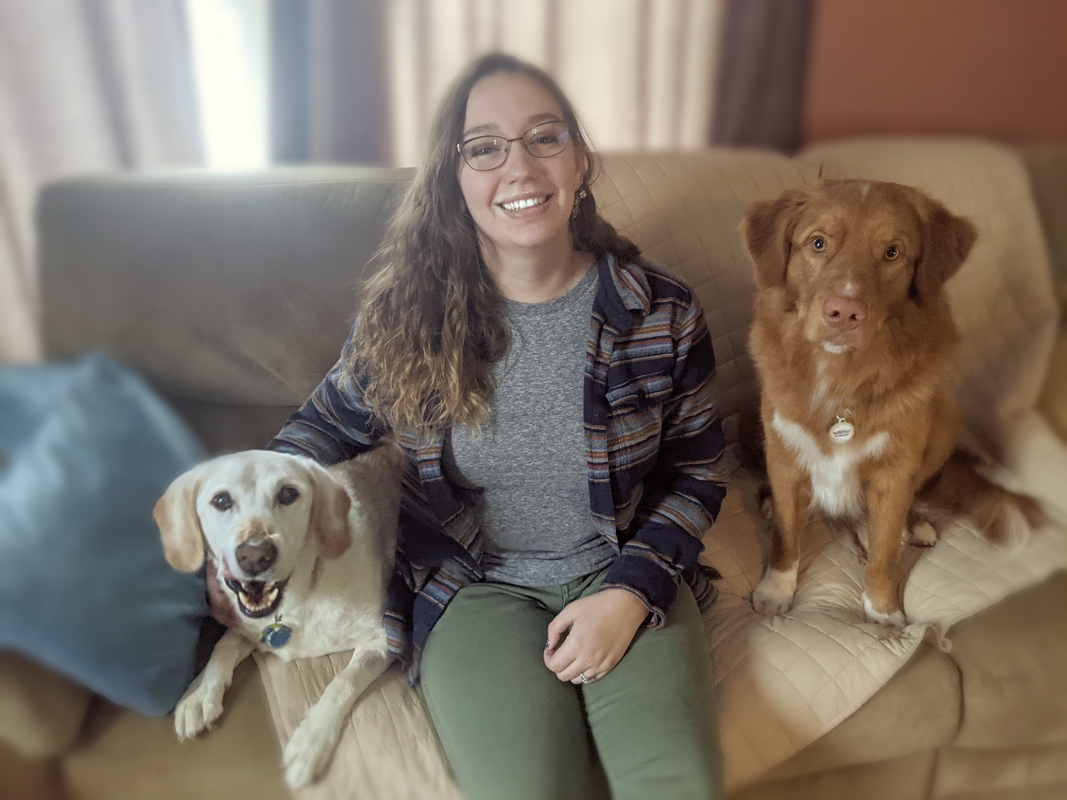|
As some of you might know, I study public health and epidemiology when I am not training dogs. In December of 2020 I will complete my Master of Public Health degree! There’s been a lot of concern and unknowns regarding the new coronavirus, known as COVID-19 or SARS-CoV-2. One question I’ve seen pop up has been concern over dogs and other pets getting the virus. While information is rapidly evolving, I’ll break down what is available as of March 11, 2020 and provide resources within this post for you to refer back to for any updates. Can my dog get COVID-19?
As far as is currently known, dogs and other pets do not become ill with the virus (AVMA, 2020; CDC, 2020). The virus is suspected to have originated in an animal, but it is assumed at this time to have originated in a bat, not any of our domestic type animals (AVMA, 2020). Can dogs spread COVID-19? No spread due to dogs (or other pets) has been reported in most of the world (CDC, 2020). However, because the virus is new and it is unknown how it survives on various surfaces and outside of the human respiratory system, the CDC recommends being safe and having someone else in the household care for your pet if you contract COVID-19. This is currently more of a recommendation to avoid accidentally spreading the disease to someone else than it is of a worry that your dog will become ill. But I heard a dog in Hong Kong had COVID-19! A pomeranian in Hong Kong did test weakly positive for the virus after their owner was diagnosed with the disease. The test that was done looks for pieces of the RNA, which is the virus version of DNA, and was done on the nasal cavity and mouth of the dog. Still, this is not a current reason for alarm at this time. The pomeranian has shown no signs of illness, so even though the disease was present, it hasn’t seemed to cause any symptoms. It’s also possible that the moist environment was simply able to let the virus exist after the dog licked a surface contaminated by their owner. Finally, the weak positive suggests that even if dogs end up with the virus, it may not reach levels high enough to transmit back to humans (AVMA, 2020). At this time you are much more likely to be infected by a human, and no dogs have become symptomatically ill! How should I be prepared? Just as the CDC recommends having supplies on hand to self-quarantine for 2 weeks if necessary, make sure the necessary dog food and any dog medicines are on hand as well for those several weeks. If you do contract the virus, follow the CDC recommendations to have others care for your dog or to wash your hands before and after interacting with your dog (AVMA, 2020; CDC, 2020). Resources Visit these links for the most accurate and up to date information! Stories floating around on social media are not necessarily accurate, so checking with those actively updating the information and controlling the spread is the most helpful way to find out what you need to know. American Veterinary Medical Association. (2020). COVID-19. Retrieved from https://www.avma.org/resources-tools/animal-health-and-welfare/covid-19 Centers for Disease Control and Prevention. (2020). Frequently asked questions and answers. Retrieved from https://www.cdc.gov/coronavirus/2019-ncov/faq.html If you're concerned about attending a dog class or private lesson during this time, but still need help with your dog, contact us! I offer web-based consults and lessons using Zoom video chat.
0 Comments
 Today we will be taking a closer look at dog training schools! This post is helpful for those looking to get started as a dog trainer, as well as those who are vetting the dog trainers they hire to ensure they will provide them with accurate and up to date information. As we’ve discussed previously when we looked at independent dog trainer certifications, there is no regulation in the dog training industry. Schools, certifications, and memberships are not required of any trainer. Trainers are also not required to adhere to any professional requirements in the United States. Many trainers do choose to attend a school, earn a certification, or hold membership with an organization. Each school, certification, and membership can tell you a little about the trainer’s philosophy and guiding ethos. Let’s break down some of the more common dog training schools! Animal Behavior College The ABC offers courses to help trainers develop the basic knowledge of dog training. Graduates earn their ABCDT (Animal Behavior College Certified Dog Trainers) designation. The organization focuses on (but does not limit it’s curriculum to) teaching positive reinforcement training methods. It also doesn’t hold graduates to continuing education or to using a specific method after graduation. ABC is a place that many trainers can start their education, but a lot of professional trainers should pursue additional education or certification as well. The Academy for Dog Trainers The Academy, as it’s often referred to by dog trainers, was formed by an exceptional trainer by the name of Jean Donaldson. This school provides a comprehensive curriculum on the education of dog training and behavior, both through online lectures and live video coaching of hands on training. Graduates earn the designation CTC, for Certificate in Training and Counseling. Karen Pryor Academy Also known as KPA, this school is high on many trainer’s lists for education in the field. Combining in-person and online work, KPA ensures their certificants receive a full and thorough education in positive reinforcement dog training. Karen Pryor is known for her work popularizing clicker training with a wide variety of animal species and her popular book, Don’t Shoot the Dog, is applicable to both animal-human and human-human relationships! Someone who has gone through KPA earns the designated KPA-CTP (Karen Pryor Academy - Certified Training Partner) and this school is a great place to begin a trainer search as well. Starmark Academy This program is 4, 8, or 12 weeks at the very longest. I am of the opinion (along with many other trainers) that this is not nearly enough time or experience to become a professional dog trainer. In addition, Starmark does not hold graduates to positive reinforcement based methods (which are recommended by the leading animal behavior organizations) and graduates may choose to use correctional collars. The company itself is known for making its own correction collar, effectively a plastic prong collar designed to pinch the neck. They designate their graduates as “Canine Training Specialists” or “Canine Training and Behavior Specialists.” I’d encourage those looking at trainers to further speak with Starmark graduates to ensure their philosophy aligns with recommended practices of positive reinforcement based training methods. National K-9 School for Dog Trainers Even shorter than the Starmark options, National K-9 offers to train someone to be a dog trainer in either 3 or 6 weeks. Upon graduation, they designate graduates as a “Certified Professional Trainer.” This is just one example of how similar certifications can seem. In comparison to National K-9, offering a “Certified Professional Trainer” designation to those who have spent only 6 weeks learning (275 hours total) about dog training at their own school, the Certification Council for Professional Dog Trainers offers an independent certification of Certified Professional Dog Trainer (CPDT-KA) to those passing a comprehensive exam on learning theory after having already 300+ hours of hands-on dog training time (outside of earning an education). As with Starmark, I’d recommend further vetting your trainer if they are a graduate from National K-9. How Do I Ask Trainers About Their Training Philosophy?
A good rule of thumb when interviewing dog trainers is to ask two simple questions.
Question two is best answered with something like, “When your dog doesn’t do what we want, we evaluate the situation and try again, setting the dog up for better success the second time.” Any response to question 2 along the lines of “a correction is delivered” or “the dog is physically forced into the correct response” should be red flags to tell you that the trainer isn’t necessarily focused on setting the dog up for success. With so many options, this is not a comprehensive list of schools, but it contains those I see most often when helping clients in other locations research their local trainers. Feel free to reach out or drop a comment below for assistance in finding a qualified trainer! Don't forget to also check out our post about independent dog trainer certifications for more information! |
MESSY Dog Blog
What do you want your dog to do? We can help you train it! Categories
All
Archives
May 2020
|
Helping dogs and their owners achieve their goals since 2016
Currently serving owners in the Cedar Falls, IA area and online.
Currently serving owners in the Cedar Falls, IA area and online.



 RSS Feed
RSS Feed
